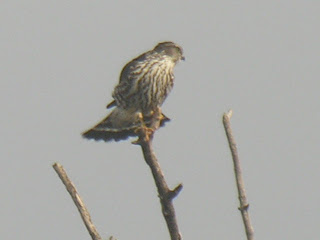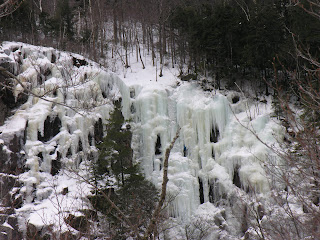Wednesday, March 30, 2011
Reminder
I just wanted to remind you that I'm still collecting data from the survey I designed. Please please, if you haven't yet filled it out click on the "Happy Birthday" post on the right. It should only take a minute or two of your time and it's very helpful for me to get some feedback about the blog. More posting to come!
Sunday, March 27, 2011
Science Education! Good God Y'all! What Is It Good For!?
Since this month marks the one year anniversary of the Mycelial Network's origins I've been thinking a bit about what this blog's purpose is and actually the purpose of science education in general.
The science blogs that I read tend to fall into two camps, maybe three. There are science blogs that report on and/or describe science findings. There are those that do that but in addition are very political, dealing heavily with topics such as vaccinations, the teaching of evolution, climate change, etc. Then there are blogs that are mainly just about interesting science but don't necessarily shy away from the more political implications of the science.
I've tended to fall mainly in the first category. I don't think science writers shouldn't weigh in on political issues. It's actually more that it frustrates me that these things are political. From my perspective evolution is a real, objectively observed phenomenon, vaccines contain and often completely eliminate disease and climate change is happening and people are directly responsible. I don't really want to get into a "debate" about climate science because in my "opinion" the facts are in and they are very, very clear. I simply don't believe there is a debate worth having.
So I tend to focus my time on trying to show my readers how beautiful, strange, creepy, bizarre, and wonderful the natural world is. This has become a more meaningful and straightforward goal.
But I wonder: what do my readers think? What is the purpose of science education? Is it productivity and progress? Do we need better science education to compete with China?
Is it political? Do we need science education because science is involved in some of the most important political "debates" of the last few decades?
Is it just interesting? Do we need science education because science is wonderful? Does this trivialize it?
Please leave a comment and tell me what you think either as an educator or as someone who enjoys being educated her/himself.
Saturday, March 26, 2011
Unintelligent Design: Dracula Ants
Some of you may know that I think about evolution a lot. One of the big reasons I got into science education was to increase evolution literacy. It deeply disturbs and depresses me that about half of the people that live in our country don't believe in evolution. I think some of those people simply don't know how it works or have a total misunderstanding of what we're saying when we say the word "evolution."
One of the big groups trying to keep people scared of evolution is known as the "intelligent design" movement. People like "biochemist" (in quotes because he brings shame to his field) Michael Behe claim that because the small features (such as a flagella or cilia) of microorganisms are actually quite complex and because the parts of those features don't "do" anything by themselves they could not have evolved by natural selection.
But the thing is sometimes things just mutate. And sometimes the function of a structure is lost over time. Evolution is not a straight line. It meanders and wobbles and every now and then a form evolves that happens to be better suited to a particular niche.
And sometimes in nature you find a species or a structure that really...just seems dumb. I may have written about this before but take the human lower back. People have bad backs because we evolved upright walking out of four-limbed locomotion. The vast majority of human anatomy didn't change and so pressure is applied in all kinds of weird and awkward ways on our lower back muscles. Doesn't seem so intelligent.
So earlier this week I read about another great example. As you may have noticed ants have really tiny waists. As a result they need to subsist on liquids. Most ant species get this liquid nutrient from the predigested food of their larvae. This is already a weird situation. They need their babies to chew up their food for them. It doesn't seem particularly intelligent to design an animal that can't eat by itself.
Now even weirder and probably dumber is the Dracula ant. This particular species diverged from other ants about 100 million years ago and does not feed in the same way. Instead they feed on blood. But not, like you might expect, the blood of other animals. It feeds on the blood of...wait for it...the larvae. The adult ants actually have to slice into the larval ants and drink their blood. How is this a good idea? It's not. But it's an example of natural selection at work. A problem needed to be solved and the genes involved mutated so that these particular animals would feed in this bizarre and, frankly, somewhat dumb manner. Now if adults feeding on the blood of babies isn't a great argument against intelligent design, I'm not sure what is.
Thanks to Myrmecos and Ugly Overload for the info:
Friday, March 18, 2011
Mistakes
If you are a science educator, or really any kind of educator, you have probably made a factual mistake either talking with students or colleagues. I made one the other day and it got me thinking about what the role of these kinds of mistakes have in our minds, in our work, etc.
I think especially as a science educator I feel pressure to always know things all the time. I have become very comfortable with saying "I don't know" and I do love to talk about uncertainty in science and things that even the great body of knowledge we call "science" has not yet learned. But still, whenever I do say those three words "I don't know" I strive to remember what it was that I didn't know and then learn it.
That's a very different experience from actively telling someone something that you, in the moment, believe to be true and then finding out later that you were wrong. I certainly try not to dwell on it but thinking about it I've found that this kind of mistake has one very beneficial side effect: there is no way I'm going to forget that information that I was wrong about. I'll remember it in a year. I'll remember it, I'm willing to bet, in fifty years.
This also ties in with a topic I think about a lot: misinformation and misconception. These are the science educators strongest opponents. And the strong negative feeling I have after making this kind of mistake is that I have, hopefully in a very small way, added to that great body of misunderstanding and misinformation instead of confronting and sorting through it.
Young children misunderstand stuff all the time though. So hopefully they'll just have forgotten.
What's your experience of factual mistakes in the classroom?
Tuesday, March 15, 2011
Hawks and Things
So I don't want to bury the post that has the link to my survey but I've been meaning to post these photos. And if you haven't yet taken the survey, what better time than right now? You're sitting in that comfy chair and all. Anyway, more of Buteo jamaicensis:

Maybe a little tough to see, but check out the blown up version the web album. Here he or she is blown up a little: kinda grainy but you can see the hawk buffeted by the wind.


I just came back from some snowshoeing up in New Hampshire. I was hoping to get more photos but it was either snowing or raining pretty much the entire time I was there. That's New England for you. Anyway, on the drive home it was just grey, not raining, so I managed to shoot a few. We drove through the area where we usually camp in the summer and saw this pretty amazing ice falls. This might not be entirely natural history related but as I uploaded the images this morning I noticed something else in the picture: there's someone climbing the ice. And here we thought we were the crazy ones for snowshoeing in the rain!

Again, you may need to head to the web album to get the full affect, but he (or possibly she) is there pretty much right in the middle of the shot, just to the right of the twig that runs up through the foreground. I hope he had a spotter!
Wednesday, March 2, 2011
Happy Birthday Mycelial Network
So it's almost the Mycelial Network's first birthday? What fabulous present did you buy it? 7% more attention and 2% more commitment to understanding concepts? Why you shouldn't have!
I've been thinking about this for a while but now that I've almost cleared my first year of writing the Mycelial Network I want to know what folks think. I've created a survey monkey to help me do that. Please, if you read the blog or if you have ever read the blog fill the survey out. Even if this is literally the first time you've ever even heard of the Mycelial Network. Seriously. It should only take you a minute or two.
This should hopefully steer any actual decisions I make about how I write the blog. Thanks everyone who does read and who may have passed the blog on to others.
Just follow the link: http://www.surveymonkey.com/s/93BZTXF
Subscribe to:
Posts (Atom)